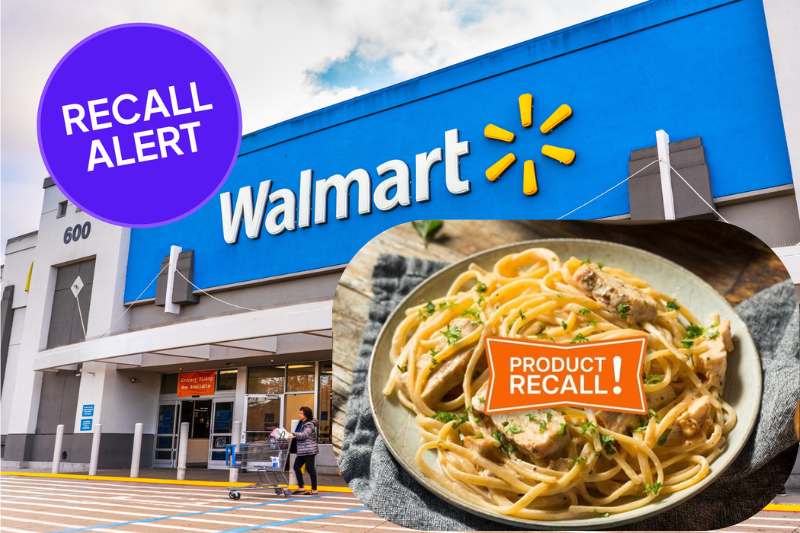
A popular meal turns deadly. A serious Listeria outbreak has prompted a nationwide recall of chicken Alfredo sold at Walmart and Kroger. Here’s what you need to know.
A widespread chicken Alfredo recall has been issued for ready-to-eat meals sold at Walmart and Kroger stores across the U.S. These meals are branded under:
Marketside (Walmart)
Home Chef (Kroger)
The recall affects various sizes of chicken fettuccine Alfredo meals, some including broccoli, with best-by dates up to June 27, 2025. Consumers are advised to check product labels immediately.
According to the CDC and FDA, this urgent recall follows a deadly Listeria outbreak that has caused 17 confirmed illnesses in 13 states.
The contaminated ready-made chicken Alfredo has tragically led to 3 deaths and one pregnancy loss since August 2024. The source was traced back after a positive sample was collected in March 2025 during an FDA inspection.
The following ready-to-eat chicken Alfredo meals are part of the recall:
Marketside Grilled Chicken Fettuccine Alfredo (32.8 oz)
Best by: June 27, 2025, or earlier
Marketside Grilled Chicken Alfredo with Broccoli (12.3 oz)
Best by: June 26, 2025, or earlier
Home Chef Heat & Eat Chicken Fettuccine Alfredo (12.5 oz)
Best by: June 19, 2025, or earlier
These products were distributed nationwide at both Kroger and Walmart, impacting thousands of stores.
Listeria monocytogenes is a bacteria that causes listeriosis, a severe infection especially dangerous for pregnant women, the elderly, and people with weakened immune systems.
Because these meals are pre-cooked and refrigerated, Listeria can grow silently in packaging. The symptoms of Listeria include:
High fever
Nausea or vomiting
Muscle aches
Headache and confusion
In severe cases, neurological issues or death
This makes ready-to-eat refrigerated meals like chicken Alfredo particularly high-risk if mishandled or contaminated during production.
The outbreak linked to chicken Alfredo sold at Walmart and Kroger has caused illnesses in the following states:
Florida
Illinois
Indiana
Louisiana
Michigan
Minnesota
Missouri
Nevada
North Carolina
Ohio
South Carolina
Texas
Virginia
The CDC warns that new cases may still emerge, as symptoms can take up to 70 days to appear after consuming contaminated food.
If you purchased Marketside or Home Chef chicken Alfredo, here’s what you should do immediately:
Check the product’s best-by date. If it falls before or on the listed recall dates, do not eat it.
Dispose of the product safely. Wrap it in a plastic bag, seal it, and throw it away.
Clean and sanitize any surfaces or refrigerator areas the package may have touched.
Watch for signs of Listeria infection for up to two months. Seek medical help if symptoms develop.
Retailers like Walmart and Kroger are offering full refunds for returned recalled meals.
The FDA, CDC, and USDA Food Safety and Inspection Service (FSIS) are working with FreshRealm, the company that manufactures the recalled meals. The investigation aims to find the exact point of contamination in the production chain.
FreshRealm has stated that it is taking the issue seriously and cooperating fully with federal agencies. It urges customers to act with caution and dispose of any affected chicken Alfredo products.
While this outbreak is alarming, you can reduce your risk with these safety practices:
Always check expiration and best-by dates.
Keep your refrigerator at or below 40°F (4°C).
Reheat refrigerated meals thoroughly before eating, even if labeled “ready to eat.”
Wash hands, utensils, and surfaces before and after handling packaged foods.
For those in high-risk groups—pregnant women, elderly adults, or those with weakened immune systems—it’s advised to avoid pre-packaged refrigerated meals unless they are reheated properly.
This chicken Alfredo Listeria outbreak is a grim reminder of how foodborne illnesses can lurk in even the most convenient meals.
If you shop at Walmart or Kroger, double-check your fridge today. The FDA and CDC stress that swift disposal and sanitization can prevent serious illness.
The investigation into the 2025 Listeria outbreak is still ongoing, and more updates are expected in the coming days.